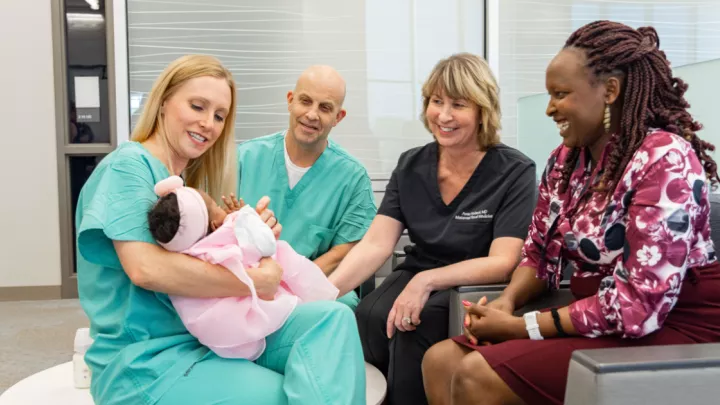Frequently asked questions about high-risk pregnancy

The Nebraska Medicine approach to maternal-fetal medicine
Being told you have a high-risk pregnancy can seem scary, but it's just a way for doctors to make sure that you and your baby get the attention you need. While you may need extra care and monitoring, most expecting mothers make it through their pregnancies with little to no complications.
Below, Teresa Berg, MD, Nebraska Medicine maternal-fetal medicine doctor, discusses frequently asked questions about high-risk pregnancies and what to expect.
What are the risk factors for a high-risk pregnancy?
If you have a high-risk pregnancy, you or your baby might be at increased risk of health problems before, during or after delivery. Compilations that cause a pregnancy to be considered "high risk" include:
- History of premature labor
- Two or more miscarriages in a row
- Advanced maternal age or those who are 35 years or older at their estimated due date
- Hypertension diagnosed before or during pregnancy
- Bleeding during pregnancy
- Diabetes
- Asthma or seizure disorders
- Post-transplant pregnancies
- Fetal anomalies
- Growth of the fetus that is too slow or too much
- Kidney problems
How are high-risk pregnancies managed compared to other pregnancies?
Your pregnancy care and screening will depend on your age, health history and other factors. If you or your baby are at an increased risk of complications, you will be referred to a maternal-fetal medicine specialist to coordinate your care and your baby’s care. If you start with a midwife, OB-GYN or family medicine doctor and later develop complications, your care may be managed collaboratively by your original doctor or midwife and a maternal-fetal medicine specialist.
Depending on your situation, expect to discuss:
- Ultrasounds: At a minimum, one in the first trimester, one at 20 weeks, and one in the third trimester (detailed ultrasonogram), but certain situations may require more
- Potential prenatal DNA screening, genetic counseling or diagnostic testing
- Antenatal fetal surveillance: tracing heart rate, fetal activity and amniotic fluid (once or twice per week)
- Preferences for labor and delivery
What’s the difference between a maternal-fetal medicine specialist and an OB-GYN?
Maternal-fetal medicine specialists, or perinatologists, are OB-GYN doctors specializing in high-risk pregnancies. They receive a traditional obstetrics and gynecology education and an additional three years of training to learn how to treat pregnancy-related complications. In addition, they have extensive training in the assessment and treatment of fetal problems.
Does a high-risk pregnancy mean a cesarean section or forceps-assisted delivery?
Having a high-risk pregnancy does not necessarily mean you will need a C-section or forceps delivery. Many people experience healthy pregnancies and normal vaginal deliveries despite having special health needs. However, these interventions may be recommended in certain situations to ensure the health and safety of you and your baby.
Do high-risk pregnancies always deliver early?
While it may increase your chances, having a high-risk pregnancy does not mean you will have preterm labor or give birth early. The goal of any pregnancy is to get you as close to a full-term delivery as possible to give your infant’s lungs, brain and liver time to fully develop. Talk to your doctor about what you can do to help.
Will my baby have to go to the NICU?
If your baby needs a higher level of care after delivery, you’ll have access to our Newborn Intensive Care Unit or NICU. Nebraska Medical Center’s state-of-the-art NICU is designed to support the needs of premature or acutely ill infants in a family-centered environment. Studies show that premature babies born in a facility that offers this type of care are likely to do better than those born elsewhere. However, having a high-risk pregnancy does not always mean your baby will need to go to the NICU.
Will my future pregnancies be considered high risk?
Having one high-risk pregnancy does not mean your future pregnancies will be deemed high risk. You may have a fetal complication occur in one pregnancy that wouldn’t in another, and certain health conditions may change over time. However, if you had a pregnancy that ended in preterm delivery, you are at greater risk of having preterm labor during your next pregnancy. If this occurs, your doctor will monitor your cervical length with ultrasound surveillance.
What advice do you have for someone who was told they have a high-risk pregnancy?
Don’t try to diagnose yourself or turn to “Doctor Google” before seeing a maternal-fetal medicine doctor. This will only create more fear and anxiety.
Also, don’t be afraid to ask your doctor to repeat or clarify something if you don’t understand. Medical visits can be overwhelming, and sometimes even the most well-meaning doctor can present too much information too quickly or use complex terms. It’s OK to ask questions; you should feel comfortable asking as many of them as you need to understand.
It’s also a good idea to have a second person with you during your appointments. We only absorb part of the information we are told, so having someone else who can help you actively listen and process the information is helpful. Doulas are a great option because they are experts in emotional support and active listening. Husbands and partners are sometimes not the best active listeners, and grandmothers can often get too hung up on the emotional side of things to process the next steps.







